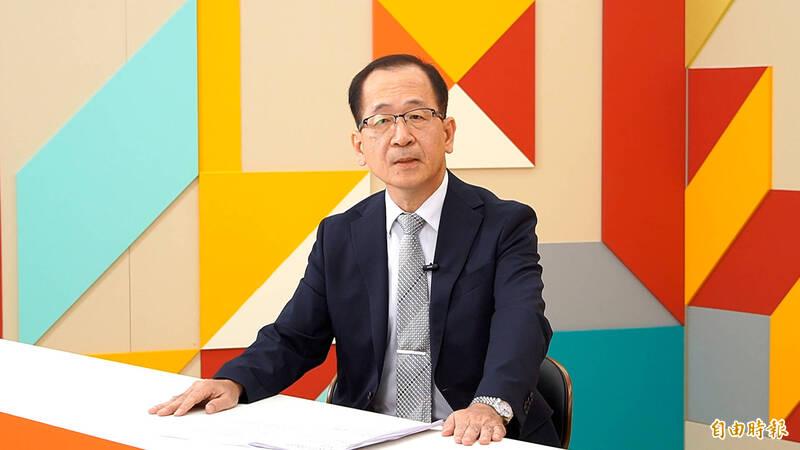The Agency of Corrections would continue to introduce AI and smart technologies to correctional facilities to create “smart prisons,” improving the allocation of resources and staff efficiency, Director of the Ministry of Justice’s Agency of Corrections Lin Hsien-ming (林憲銘) said.
Taiwan’s correctional facilities continue to face the long-term issue of overcrowding, particularly as recent government crackdowns on fraud and money laundering have led to an additional 8,000 prisoners, creating a shortage of correctional staff.
Two major initiatives are currently underway to tackle these challenges: a security network and smart systems, Lin said, adding that new systems would continue to be improved, tested and rolled out across prisons following the latest technological advancements.

Photo: Huang Yun-hsuan, Taipei Times
Firstly, an external “technology-driven security network” would improve monitoring and recording systems for better surveillance, he said.
Correctional facilities currently use digital surveillance cameras, recently upgraded from analog, with footage uploaded to a cloud-based system and utilizing facial recognition and detection features, he said.
As an example, facial recognition technology can detect where each prisoner is and how many inmates are in each area, and once a prisoner leaves an assigned area, the system would trigger an alert, he added.
Moreover, electric fences have been installed around the perimeter which would also trigger alarms if unauthorized people or vehicles are detected, reducing the need for constant patrols and helping relieve the strain of staff shortages, he said.
The second initiative is the integration of technology into staff management and inmate rehabilitation programs, he said.
For example, when inmates purchase daily necessities from prison cooperatives, they previously had to fill out multiple paper forms, requiring manpower as staff manually checked forms, purchases and payments, he said.
With a new digitalized system, similar to a fast-food kiosk, inmates can scan their faces, place orders and complete payment verification, he added.

Three batches of banana sauce imported from the Philippines were intercepted at the border after they were found to contain the banned industrial dye Orange G, the Food and Drug Administration (FDA) said yesterday. From today through Sept. 2 next year, all seasoning sauces from the Philippines are to be subject to the FDA’s strictest border inspection, meaning 100 percent testing for illegal dyes before entry is allowed, it said in a statement. Orange G is an industrial coloring agent that is not permitted for food use in Taiwan or internationally, said Cheng Wei-chih (鄭維智), head of the FDA’s Northern Center for

LOOKING NORTH: The base would enhance the military’s awareness of activities in the Bashi Channel, which China Coast Guard ships have been frequenting, an expert said The Philippine Navy on Thursday last week inaugurated a forward operating base in the country’s northern most province of Batanes, which at 185km from Taiwan would be strategically important in a military conflict in the Taiwan Strait. The Philippine Daily Inquirer quoted Northern Luzon Command Commander Lieutenant General Fernyl Buca as saying that the base in Mahatao would bolster the country’s northern defenses and response capabilities. The base is also a response to the “irregular presence this month of armed” of China Coast Guard vessels frequenting the Bashi Channel in the Luzon Strait just south of Taiwan, the paper reported, citing a

UNDER PRESSURE: The report cited numerous events that have happened this year to show increased coercion from China, such as military drills and legal threats The Chinese Communist Party (CCP) aims to reinforce its “one China” principle and the idea that Taiwan belongs to the People’s Republic of China by hosting celebratory events this year for the 80th anniversary of the end of World War II, the “retrocession” of Taiwan and the establishment of the UN, the Mainland Affairs Council (MAC) said in its latest report to the Legislative Yuan. Taking advantage of the significant anniversaries, Chinese officials are attempting to assert China’s sovereignty over Taiwan through interviews with international news media and cross-strait exchange events, the report said. Beijing intends to reinforce its “one China” principle

A total lunar eclipse, an astronomical event often referred to as a “blood moon,” would be visible to sky watchers in Taiwan starting just before midnight on Sunday night, the Taipei Astronomical Museum said. The phenomenon is also called “blood moon” due to the reddish-orange hue it takes on as the Earth passes directly between the sun and the moon, completely blocking direct sunlight from reaching the lunar surface. The only light is refracted by the Earth’s atmosphere, and its red wavelengths are bent toward the moon, illuminating it in a dramatic crimson light. Describing the event as the most important astronomical phenomenon